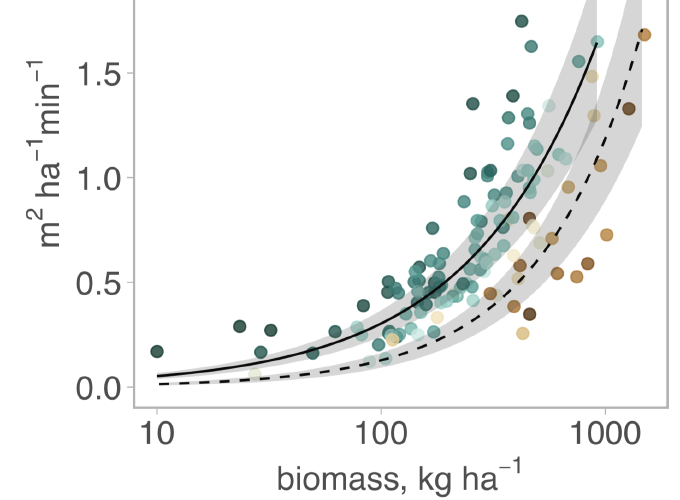This is my Plain Language Summary posted on Functional Ecology
Coral reefs support high numbers of fishes which feed on plant material – these reef herbivores include surgeonfish which act as lawnmowers to ‘crop’ turf algae and parrotfish with powerful beaked jaws which ‘scrape’ algae and dirt from the reef.
Experiments have shown that cropping and scraping are key ecological functions on coral reefs, helping to maintain reefs in coral-dominated states, particularly after events such as coral bleaching which kill corals and allow fast-growing turf algae and seaweeds to take over. At larger spatial scales – across the Great Barrier Reef, or among Pacific atolls –the biomass of cropping and scraping species can vary greatly, which has been linked to effects of fishing and habitat quality on fish populations.

School of Singapore parrotfish (Scarus prasiognathos) grazing on an Indo-Pacific reef (credit: Tane Sinclair-Taylor)
Analyses which tie these two approaches together – small-scale feeding rates with large-scale fish biomass estimates – can be used to measure cropping and scraping rates for entire coral reef ecosystems, and so identify influences of fishing and habitat on grazing functions. In our paper, we generated estimates of grazing functions – cropping and scraping - at 72 coral reefs across the Indo-Pacific, combining underwater feeding observations with fish biomass data from Seychelles, Maldives, the Chagos archipelago, and the Great Barrier Reef. We found that cropping rates depended on reef habitat complexity and the amount of available space on the reef floor, whereas scraping rates were most strongly affected by fishing pressure. These patterns allow us to infer that cropping function will increase in response to loss of corals, and show that scraping function on most reefs is now far below levels observed on unfished, wilderness reefs.


